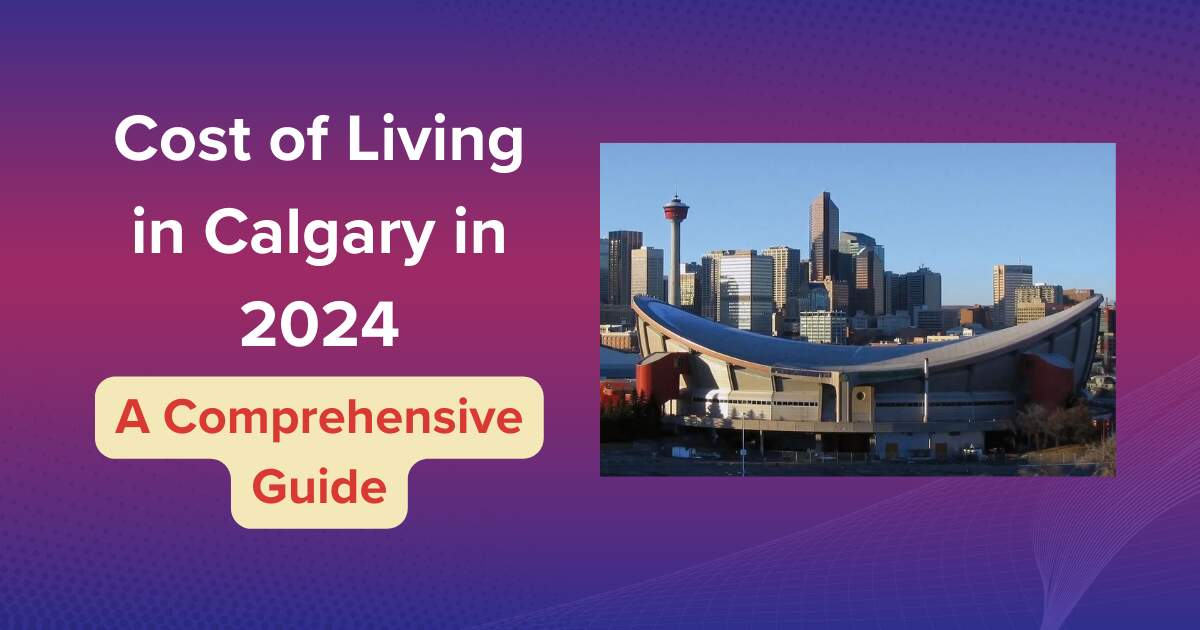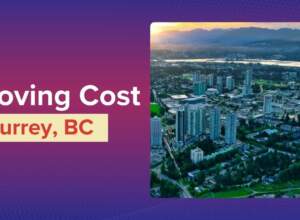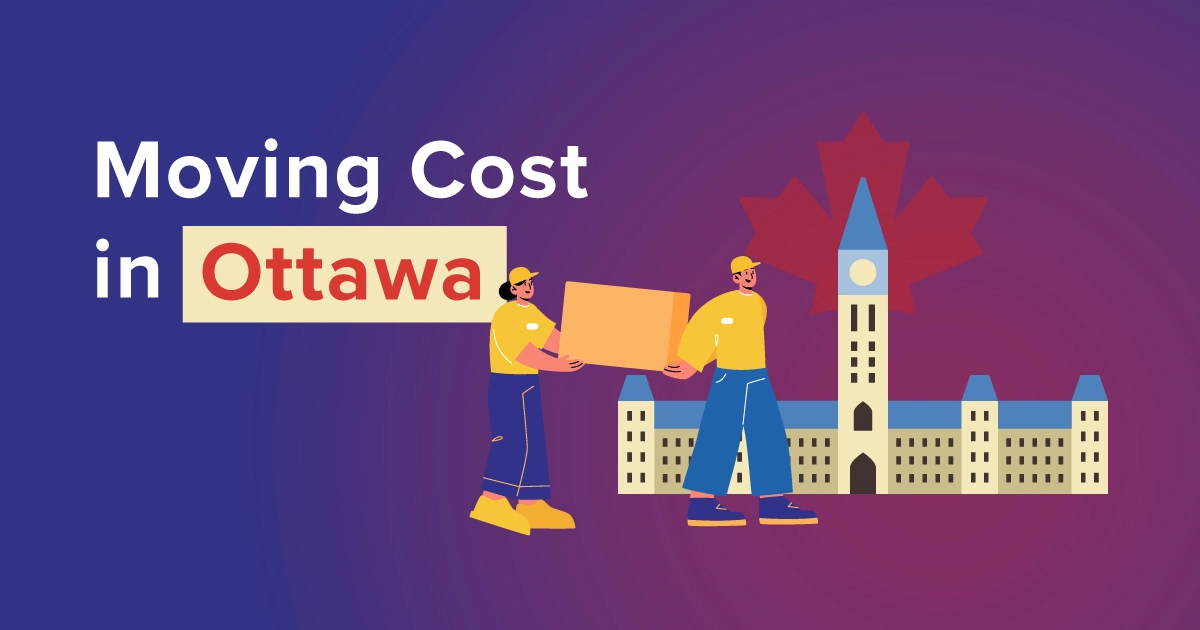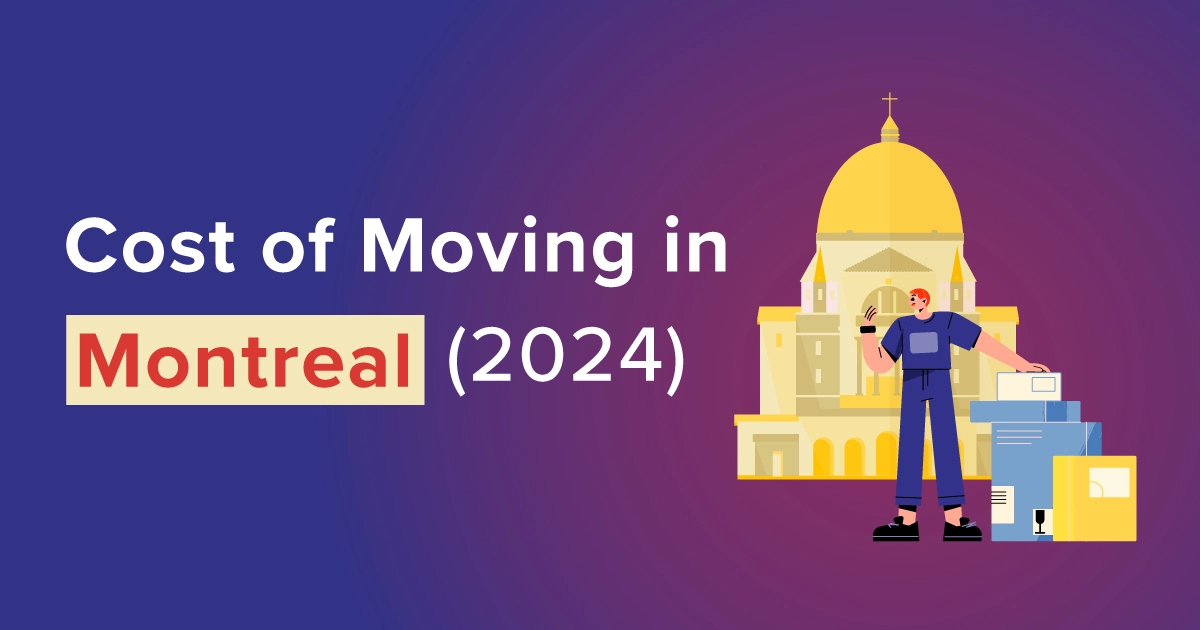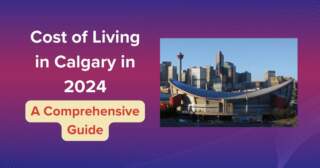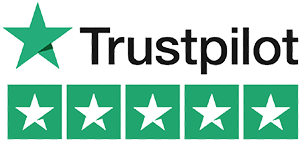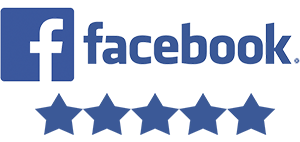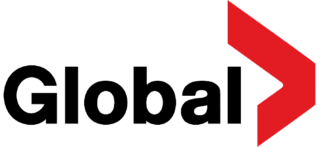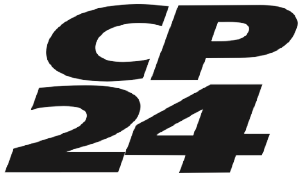Nestled in the heart of Alberta, where the prairies meet the mountains, Calgary is a major Canadian city renowned for its economic vitality, reasonable moving cost, and breathtaking landscapes.
Calgary’s allure extends beyond its economic prowess and natural beauty; it is a city that embraces both newcomers and longtime residents with open arms. With a population of 1.3 million and room to grow, Calgary uses its diverse opportunities and lower cost of living—compared to other major cities in Canada and worldwide—to draw people to live and work here.
As we delve into the intricacies of Calgary’s cost of living, it becomes evident that understanding it is beneficial and essential for anyone seeking to thrive in this dynamic Canadian metropolis. Join us as we unravel the nuances of Calgary’s cost of living, offering insights that will empower both current residents and prospective newcomers to navigate this vibrant city with confidence and clarity.
Researching the Average Cost of Living in Calgary Before Moving
Are you eyeing Alberta as your next home base? You’re certainly not alone! Canadians from all over are moving here, enticed by promising job prospects and a comparatively affordable cost of living. Yet, it’s a reminder that “comparatively affordable” does not equal “cheap.”
Recent insights from Statistics Canada shed light on the economic landscape, revealing that essential expenses such as groceries, home heating, and transportation are more expensive in Calgary than in most other major Canadian cities, excluding the territories.
Diving deeper into the numbers, the Market Basket Measure (MBM) unveils the financial requirements for a family of four to cover necessities like housing, food, clothing, and transportation. In Alberta, this figure is $55,771, surpassing the benchmarks set by cities like Toronto and Vancouver, known for their steep living costs.
Understanding these economic dynamics can guide your decisions and ensure a smooth transition to Alberta’s vibrant and opportunity-rich landscape.
Cost of Housing in Calgary, Alberta
In 2023, a Demographia International Housing Affordability report, Calgary, Alberta, is one of the 25 most affordable housing markets out of more than 90 places surveyed. The report compared housing costs in different countries, including Australia, China, Ireland, New Zealand, Singapore, the U.K., the U.S., and Canada.
The average cost of housing (single-family, townhome, condo) here is about half that of Toronto and less than half of the cost of equivalent housing in Vancouver.
Price of a home in Calgary
Build your dream home in Calgary, where the price of a home affords more houses. As of 2022, Calgary’s benchmark (predicted price in an area) home price stood at $516,817. In contrast, the cost of purchasing a home in Vancouver or Toronto was more than double that of Calgary. The home purchase price here makes the city ideal for anyone looking to buy their first home.
Here’s a table showcasing the average cost range for various types of housing in Calgary:
| Housing Type | Description | Average Cost Range |
|---|---|---|
| 1 Bedroom Apartment | Single bedroom unit in apartment building | $1,000 – $1,500 per month |
| 2 Bedroom Apartment | A two-bedroom unit in an apartment building | $1,300 – $2,000 per month |
| Detached House | Stand-alone single-family house | $400,000 – $1,000,000 |
| Semi-detached House | Attached house sharing one wall | $350,000 – $800,000 |
| Townhouse | Multi-level units attached to other houses | $300,000 – $700,000 |
| Condominium | Individual units in a multi-unit building | $250,000 – $600,000 |
| Duplex | Two separate living units in one building | $400,000 – $800,000 |
The prices here are approximate averages and may vary based on location, size, amenities, and market conditions. It’s recommended to consult real estate listings or agents for specific property prices in Calgary.
The housing market in Calgary has experienced fluctuations in recent years. Home purchase costs vary significantly, with detached houses averaging between $400,000 and $1 million, depending on size and location.
Cost of Renting a Home in Calgary
The cost of renting a home in Calgary reflects a range of options to suit different budgets and preferences.
Here’s a table showing the average cost range for different types of accommodations in Calgary:
| Accommodation Type | Description | Average Monthly Cost |
|---|---|---|
| 1 Bedroom Apartment | Single bedroom unit in apartment building | $1,000 – $1,500 |
| 2 Bedroom Apartment | A two-bedroom unit in an apartment building | $1,300 – $2,000 |
| Semi-detached House | Attached house sharing one wall | $1,500 – $2,500 |
| Two Bedroom House | Single-family house with two bedrooms | $1,500 – $2,500 |
These approximate prices may vary based on location, size, amenities, and market conditions. It’s recommended to consult real estate listings or agents for specific property prices in Calgary.
Additional Parking
Is no parking included in your rental? Parking fees in residential Calgary can range from $50 to $200 monthly. Unfortunately, the downtown core has record-setting ($366 on average) fees compared to the rest of Canada.
Calgary Tenant Insurance
Once you sign a lease, you’ll have to get tenant insurance. Some rentals may require proof of insurance; either way, it’s mandatory when renting a home in Calgary. Many companies offer tenant insurance, keeping prices competitive at about $20-50 per month.
Security Deposit
Landlords typically require a security deposit when renting a home in Calgary to protect against damages or unpaid rent. The deposit amount can vary but is often equivalent to one month’s rent. This deposit is refundable at the end of the tenancy minus any deductions for damages or outstanding fees.
Cost of Lawn Care and Snow Removal
In Calgary, the warm months for enjoying a lush lawn are short. That’s why it might be worth budgeting for lawn care services to keep your grass looking great during that time.
Prices for essential services like mowing, trimming, fertilizing, and weed control go by lawn size and frequency of visits. Expect to pay at least $42 per week or $62 for a one-off visit.
Snow removal is an undeniable necessity in Calgary from fall to spring unless you own a snowblower ($1,898). That can cost a flat rate of $250 per month, whether it snows or not.
Cost of Calgary Cleaners
Professional cleaning services in Calgary vary based on the size of the home, the scope of work, and the specific cleaning company hired. On average, a standard cleaning service for a one-bedroom apartment can range from $80 to $150 per visit, while larger homes or more extensive cleaning may cost upwards of $200 or more.
Cost of Hiring Movers in Calgary
Professional movers are kept busy in Calgary, which keeps the competition stiff and prices reasonable. If you move within the city, from one neighbourhood to another, expect to pay about $150 per hour for professional Calgary movers. This cost includes truck, fuel, labour, and coverage. The price may be higher if you include services like packing and unpacking.
Utilities and Basic Expenses
Utilities such as electricity, heating, water, and internet typically total around $150 to $200 monthly.
1. Electricity
The cost of electricity in Calgary varies depending on factors such as consumption, property size, and the provider. On average, residents can expect to pay between $60 to $100 monthly for electricity, with higher usage during peak heating or cooling seasons.
2. Heating
Calgary’s climate necessitates efficient heating systems during the winter months. The cost of heating, typically fueled by natural gas or electricity, can range from $80 to $150 per month for a small to medium-sized home. Energy-efficient upgrades or smart thermostats can help lower heating costs.
3. Water
Water bills in Calgary are based on usage and can vary widely. The typical monthly bill for water and sewer services is about $110.81. Conservation measures like fixing leaks and using water-saving fixtures can lower water bills.
4. Internet
Internet services in Calgary offer various packages with different speeds and features. Service costs $50 to $100 monthly, depending on the provider, connection type (fibre, cable, DSL), and desired speed. Bundling internet with other services like TV or phone may offer discounts.
These estimates provide a general idea of the monthly expenses for utilities in Calgary. Your actual costs depend on your usage habits, property size, and service provider rates. If you work from home, you can claim these costs on your taxes.
Cost of Groceries in Calgary, Alberta
Recent data based on consumer surveys, market research, reports from organizations such as Statistics Canada, and local grocery price tracking services estimate that grocery expenses for a single person in Calgary are about $500 per month.
Jennifer House, a dietitian and the owner of First Step Nutrition knows about the cost of groceries here in Calgary.
“It’s significantly more than the cost in most of Ontario. A few months ago, I was shopping in the produce section, and a man said, ‘Wow, your produce is so much more expensive here than in Toronto!’
“I have a family of 5 (including two teens) and most often shop at Costco (for bulk and reasonable prices) and Sobeys (for convenience). We spend about $1500 a month on groceries.
As a dietitian, I offer some tips: It doesn’t have to be fresh. While it’s not unusual to see a small pint of berries for $8 or $9, I grab them for under $5 when on sale! But frozen berries and all fruits and vegetables are just as (if not more) nutritious than fresh and cheaper. Canned tuna or beans can be affordable, accessible protein sources.
AM 770 Radio with Sue and Andy recently did a grocery basket cost of stores in Calgary, and Walmart was by far the cheapest.”
As an example, here is what $125 could purchase at the Calgary Walmart this week:
| ITEM | PRICE |
|---|---|
| Thick-sliced bacon | $9.97 |
| 6 chicken breasts | $20 |
| Romaine lettuce | $2.94 |
| Mini potatoes | $4.97 |
| Cantaloupe | $3.97 |
| Frozen fruit | $5.38 |
| Spinach | $4.87 |
| White rice | $4.97 |
| Pizza kit | $7.97 |
| Shredded cheese | $10 |
| 6 croissants | $4.97 |
| Loaf bread | $3.97 |
| Toothpaste | $0.84 |
| Tide pods | $20.94 |
| Toilet paper | $19.24 |
| TOTAL | $125 |
The average cost of groceries for a single person in Calgary can vary depending on dietary preferences, shopping habits, and lifestyle choices.
Keep in mind these are the prices before taxes. When creating a budget for Calgary, you must add taxes to most purchases, or your calculations will be off.
Taxes on retail items in Calgary
In Calgary, Alberta, the retail taxes applicable to items like food, toiletries, clothing, housewares, and more are as follows:
- GST (Goods and Services Tax): The GST is a federal tax applied to most goods and services in Canada, including groceries. As of the current tax rates, the GST is 5% on eligible grocery items.
- PST (Provincial Sales Tax): Alberta does not have a provincial sales tax, which is unique compared to other provinces.
- Local Taxes: Calgary does not impose specific local taxes. However, certain non-essential items, such as restaurant meals or ready-to-eat foods, may be subject to additional taxes or different tax rates.
For most grocery purchases in Calgary, only the 5% federal GST applies, making it relatively straightforward compared to regions with federal and provincial sales taxes.
Cost of Owning a Car in Calgary
The cost of owning a car in Calgary depends on the type of car, insurance coverage, maintenance, and fuel expenses. Here’s a breakdown of potential costs associated with owning a car in Calgary:
1. Vehicle Purchase Price
The initial cost of buying a car can vary widely depending on the make and model and any additional features or upgrades. New vehicles in Calgary can range from $20,000 to over $100,000, while used cars offer a more affordable option starting from around $5,000.
2. Insurance
Car insurance rates in Calgary can range from $1,000 to $2,000 annually, depending on individual factors, such as age, years of driving, and past claims and traffic tickets.
3. Fuel
Calgary’s fuel costs fluctuate based on global oil prices and local market conditions. According to recent data, gasoline prices in Calgary average around $1.20 to $1.50 per litre, with diesel prices slightly higher.
4. Maintenance and Repairs
Basic, regular vehicle maintenance in Calgary can cost between $200 and $500 annually, depending on the vehicle’s age and mileage. Snow tires are necessary and cost between $984 and $1796 for four.
Cost of Leasing a Car in Calgary
Monthly lease payments vary depending on the car’s value, lease terms, and applicable down payment or trade-in value, but they will be lower than the monthly payments on the equivalent car when purchased. Insurance on a leased car is like that on a purchased car; it depends on coverage levels and the value.
While routine maintenance falls under the manufacturer’s warranty during the lease period, lessees are responsible for any excess wear and tear or damage beyond everyday use. Finally, leasing agreements often have mileage restrictions, increasing fees if exceeded.
Is a Car Necessary in Calgary?
Whether it’s necessary to own a car in Calgary depends on various factors, including personal preferences, lifestyle, and individual circumstances.
Calgary’s climate, particularly during winter, may influence the decision to own a car. While public transit and alternative transportation options are available, having a vehicle can provide flexibility and convenience, especially during inclement weather or travel outside the city.
Deciding between owning and leasing a car in Calgary depends on individual preferences, budget considerations, and driving habits. Calculating the total cost of ownership or lease is a good start.
Alternative and Public Transportation in Calgary
Besides Uber and Lyft, there are a few reliable ways to get around Calgary without a car if you are on a budget or saving up to buy a car in the future.
1. Public Transportation
Calgary offers a comprehensive public transportation system, including buses and CTrain (light rail transit). Fares cost $3.70 per adult ticket. The cost, efficiency, and public transportation coverage can make it a viable alternative to owning a car.
2. Biking Around Calgary
The City of Calgary continues to invest in bike lanes and cycling infrastructure, promoting alternative modes of transportation for short trips and commuting. Plus, they allow two companies to provide access to shared bikes:
- Neuron: The Neuron app offers a pay-per-ride option. The rate is $1.15 + $0.35 per minute, plus tax. There are 3-day, weekly, and monthly passes for as little as $3.73 daily.
- Bird Canada: The cost of riding Bird Bikes and Bird e-scooters is the same in each city. In Windsor, for example, riding either vehicle costs $1.15 to unlock and $0.42 per minute. As helmets are mandatory for bike riders in Calgary, riders can get a free helmet from Bird Canada.
3. Car Sharing Services
Car-sharing programs like Communauto provide convenient options between $3.90 to $14 per hour for trips to Banff or Costco. This is an excellent solution if you don’t require a vehicle daily. There’s also a free membership option, but then the rate jumps to $14 per hour.
Entertainment and Recreation Costs in Calgary
The city boasts numerous entertainment options, including theatres, museums, and outdoor activities.
Calgary is the sunniest major city in Canada. It is less than an hour from the Canadian Rocky Mountains, or the Rockies, as we locals call them. With a backyard full of hiking, skiing, and snowshoeing trails, Calgary’s surrounding areas offer endless opportunities for active recreation.
Calgary has two of the world’s largest urban parks and the most extensive outdoor pathway and bikeway network in North America. Whether cycling, jobbing, strolling, river surfing on the Bow River, or ice skating in your community, outdoor activity is part of Calgarians’ everyday lives.
Also, year-round facilities like the MNP Community & Sport Centre, YMCA, WinSport (where Calgary hosted the Winter Olympics in 1988), and Alberta Tennis Centre keep you active during the colder months.
For a night out at Theatre Calgary, tickets start at $39, or you could spend a rainy day browsing the exhibitions at the Glenbow Art Museum for free. For year-round family fun, the Calgary Zoo, Telus Spark Science Centre, and Heritage Park offer seasonal programs and activities.
How Much Are Tickets To The Calgary Stampede?
Finally, you can’t live here without attending the Calgary Stampede, a massive rodeo and exhibition event that attracts visitors worldwide with rodeo competitions, chuckwagon races, concerts, and cultural exhibits.
General admission tickets for adults typically start around $23 per person for a day’s access to the Stampede Park grounds, plus $18 for parking. Special events associated with the stampede are ticketed separately.
Cost of Healthcare in Calgary
Alberta has a fully integrated, publicly funded provincial health care system, Alberta Health Services (AHS). The AHS provides health services to more than 4.4 million patients, including new, returning, and temporary residents. You must sign up with the Alberta Health Care Insurance Plan (AHCIP) to get these free health services in Alberta.
Childcare Costs in Calgary
Calgary is a city designed with families in mind. It is ranked third out of 51 on a list of Canada’s most family-friendly cities.
Childcare costs can be significant at first, with daycare fees averaging $1,000 to over $1,600 per month per child. However, an Alberta Affordability Grant is part of a federal-provincial childcare agreement.
By 2026, the province promises that parents will pay an average of $10 per day.
How Much Do People Earn in Calgary?
Average salaries in Calgary differ across industries, with sectors like oil and gas, technology, and healthcare offering competitive wages. The city’s economic stability and job market resilience attract professionals seeking career opportunities. At $107,400, Calgarians have one of the highest after-tax incomes nationally, better than Toronto, Vancouver and Montreal. For a decade, Alberta has maintained all Canadian provinces’ top median after-tax income. You can build your dreams in Calgary, plus low provincial income tax, no PST and no land transfer tax.
Energy and Environment
Calgary is the heart of Canada’s oil and gas industry, with many major energy companies headquartered there. This sector has historically played a significant role in Calgary’s economy and development. On average, you can expect to earn between $80,000 and 120,000 annually in this sector.
Aerospace
The aerospace industry in Calgary offers competitive salaries. Aerospace engineers and professionals earn between $70,000 and $120,000 per year, depending on experience and specialization.
Agribusiness
In the agribusiness sector, salaries vary widely based on roles and responsibilities. Agricultural technicians and managers may earn between $50,000 and $80,000 annually, while farming engineers and specialists can command higher salaries ranging from $80,000 to $120,000.
Creative
The creative industry encompasses various professions, including graphic designers, artists, writers, and filmmakers. Salaries in the creative field can vary significantly based on experience, portfolio, and project scope, with entry-level positions starting around $35,000 to $50,000 and others earning upwards of $80,000 to $100,000 annually.
Digital Media and Entertainment
Professionals in digital media and entertainment, such as web developers, content creators, and digital marketers, can expect competitive salaries in Calgary. Entry-level positions may start at $45,000 to $60,000, while senior roles can offer wages of $100,000 per year or more.
Financial Services
Calgary’s financial services sector offers lucrative career opportunities, including banking, investment, and insurance. Salaries in financial services vary based on roles and experience levels, with financial analysts earning around $60,000 to $80,000, financial advisors and managers averaging $80,000 to $120,000, and executives commanding salaries well over $150,000 yearly.
Life Sciences
The life sciences industry, encompassing biotechnology, pharmaceuticals, and healthcare research, provides competitive salaries for professionals in Calgary. Biomedical engineers, research scientists, and healthcare professionals can earn salaries ranging from $60,000 to $120,000 annually, depending on qualifications and expertise.
Technology
Calgary’s technology sector offers competitive salaries for IT professionals, software engineers, and developers. Entry-level IT positions may start at $50,000 to $70,000, while experienced software engineers and IT managers can earn salaries exceeding $100,000, with some specialized roles commanding six-figure incomes.
Transportation and Logistics
Transportation and logistics professionals, including supply chain managers, logistics coordinators, and transportation analysts, can expect competitive salaries in Calgary. Salaries typically range from $50,000 to $90,000 annually, with higher-level management positions offering wages above $100,000 depending on experience and industry specialization.
The salary ranges we’ve included are a general overview of average earnings across critical industries in Calgary. Actual salaries may vary based on education, experience, company size, and economic conditions.
What Are the Affordable Neighbourhoods in Calgary?
Calgary boasts over 190 diverse neighbourhoods, each offering unique character and amenities. Affordable options can be found across the city, with areas like Forest Lawn, Penbrooke Meadows, and Falconridge offering relatively lower housing costs than downtown or upscale neighbourhoods. Conducting thorough research and exploring different neighbourhoods can help you find an affordable and suitable place to call home in Calgary.
Conclusion: In Calgary, You Can Have More Money for What Matters Most
In conclusion, while Calgary offers a desirable lifestyle and economic prospects, navigating its cost of living requires careful consideration and planning. By understanding housing, utilities, education, and entertainment costs, residents can make informed decisions to enhance their well-being in this vibrant city.
This lower cost of living, coupled with Calgary’s growing urban landscape and abundant opportunities, makes it a compelling new home for those seeking a fulfilling career and life.
Ready to book movers in Alberta to relocate you to Calgary?
